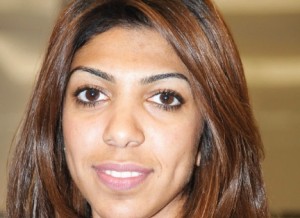Naziha Said torture case: After four years, evidence was not enough
Bahrain Press Association – London, November 19, 2015: “Criminal charges cannot be pressed due to lack of insufficient evidence” that’s what was stated by the Special Unit of Investigation on Sunday, November 15, 2015 when it decided to close the investigations in the torture case of the Bahraini journalist Naziha Said by a Bahraini female officer.
The case dates back to 22 May 2011, when Naziha Said, the correspondent of France 24 Channel and Monte Carlo Radio, responded to a request by the Rifa police station to attend the station.
Naziha’s visit to the police station lasted for 12 hours, where her eyes were blindfolded and she was subjected to a floodgate of brutality and inhumane mistreatment.
Upon her arrival to the police station, a black bag mask was put on her head and she was left in the care of a policewoman. The investigation started by attempting to establish wither Naziha was present in the Pearl Roundabout, the site of the public protests in Bahrain in 2011, and by virtue of the nature of her work as a journalist, she answered affirmatively, noting that her work requires her to cover the events.
Naziha said she was subjected to merciless and strong slaps on her face, then a female investigator took a plastic pipe and began hitting her on various parts of her body with violent and merciless strikes. When she fell to the ground Naziha was subjected to verbal abuse and mockery by the female investigators.
Naziha also stated that she was forced by the investigators to sit on a chair in the opposite way, her face facing the back of the chair, then she was brutally hit on her back while the verbal abuse and humiliation continued.
Immediately after this incident, Naziha had a range of medical tests and obtained medical reports that prove her exposure to torture. A delegate from the French Embassy contacted Naziha then and became witness on the torture she has been subject to because of the evident deplorable condition they found her in including infected facial scars. A decision was made then to send her to France to receive treatment.
For those who ask about the offense committed by Naziha, her only mistake was that she became a witness on the killing of a demonstrator Mr Issa Abdul Hassan by one the police officers. By virtue of her work as a journalist, she had to cover the events of the early hours of 17 February 2011 at the Pearl Roundabout, when the army and police forces attacked the protester, Naziha’s bad luck made her witness a security man put the barrel of his gun on the head of that old man and with one shot his brain exploded and scattered on the walls- a coincidence that the Bahraini police officers did not forgive her for.
Naziha’s determination to bring to bring to justice her abusers made her embark on a legal battle that lasted for 4 years. The Bahraini Public Prosecution Office filed charges against Lieutenant Sara Mousa for the “use of force to extract confessions from the journalist and beating her causing her injuries”. The legal battle ended after the appeal stage where the officer was acquitted of all charges. It was a clear confirmation that
“Reporters without Borders” organization, renamed the street, where the Bahraini Embassy in Paris is located at the beginning of this month and called it “Naziha Saeed Street” in a symbolic gesture towards the embassies of countries where the perpetrators against journalists escaped with impunity in an attempt to “draw the attention of these countries and remind them of their duty to take action and investigate these crimes and bring the perpetrators to justice” according to the organization.
In addition, Saeed won, last year Johann Philipp Palm Prize for freedom of expression and press.
The Foundation said that Naziha has been awarded this prize in recognition of her work in to support the freedom of the press in her home country, noting that her case has attracted international attention and that her ordeal has attracted attention to her fellow prisoners as well.
Furthermore, the Foundations has launched a project to train journalists in Bahrain to conduct their risky mission with as much safety as possible, and to produce impartial reports in line with the principles and ethics of journalism.
Palm Foundation trustees Board referred to the nomination of Naziha by the Committee to Protect Journalists, noting that she has exerted remarkable efforts and demonstrated courage in order to contribute to the democratic transition in her country and the promotion of freedom of the press.
